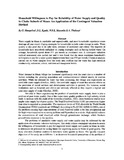| dc.contributor.author | Mmopelwa, G. | |
| dc.contributor.author | Kgathi, D.L. | |
| dc.contributor.author | Masamba, W.R.L. | |
| dc.contributor.author | Thukuza, A. | |
| dc.date.accessioned | 2011-12-02T08:21:39Z | |
| dc.date.available | 2011-12-02T08:21:39Z | |
| dc.date.issued | 2005 | |
| dc.identifier.citation | Mmopelwa, G. et al (2005) Household willingness to pay for reliability of water supply and quality in Chobe suburb of Maun: An application of the contingent valuation method, Botswana Notes and Records, Vol.37, pp. 97-107 | en_US |
| dc.identifier.uri | http://hdl.handle.net/10311/938 | |
| dc.description.abstract | Water supply in Maun is unreliable and unpredictable, and most households experience water
shortage all year round. Coping strategies for households include water storage in tanks. Water
quality is also poor due to its salty taste, presence of sediments and colour. The majority of
households have henceforth embarked on coping strategies such as buying bottled water. On average, households spend about P71 per month as avoidance cost. A contingent valuation method assessment was carried out and it was found that the mean maximum household’s
willingness to pay for a water quality improvement fund was P55 per month. Chemical analysis
carried out on water samples from the study area confirm that the water has high electrical
conductivity, sediments, colour, and iron and manganese levels. | en_US |
| dc.language.iso | en | en_US |
| dc.publisher | Botswana Society | en_US |
| dc.subject | water supply | en_US |
| dc.subject | contingent valuation method | en_US |
| dc.subject | Chobe suburb | en_US |
| dc.title | Household willingness to pay for reliability of water supply and quality in chobe suburb of Maun: An application of the contingent valuation method | en_US |
| dc.type | Published Article | en_US |
| dc.link | http://www.jstor.org/stable/10.2307/40980407 | en_US |

